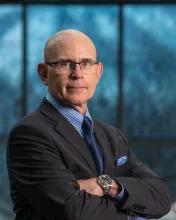Turbulent times can either paralyze you with fear or energize you with unlimited opportunities – and great leaders are often what make the difference. In the midst of complexity and volatility, top leaders anticipate and adapt. They build clarity out of uncertainty. They communicate a vision that inspires you to strive for more. They challenge and elevate their teams, giving people the confidence to not just persevere but step up to the big moments and make bold things happen.
When it comes to developing these kinds of leaders, there’s one organization that truly stands apart from the rest: the U.S. military. There are also many lessons and parallels from that high-stakes world that apply to today’s digital leaders.
In a recent episode of the Tech Whisperers podcast, I had the chance to sit down with three CIOs who started their careers in the military: Mike Goodwin, CIO of PetSmart and a former Army officer; Woody Groton, CIO of Draper and a former Army officer who is currently a Brigade Commander for the Army National Guard; and DiAnna Thimjon, a strategic advisor to CxOs, four-time CIO/CTO and former Army officer. They shared some powerful lessons of adaptability, preparedness, and resilience.
We also explored how the military helped them build a mindset and skillset that has served them well in their civilian careers. Here, they offer advice for today’s emerging IT leaders.
Dan Roberts: What leadership advice has really resonated and stuck with you throughout your career?

Mike Goodwin: Wayne Herron was group vice president of operations when I was in one of my first senior director roles supporting his organization, and he was like a student of leadership. He would come out with these quotes that would just resonate and get woven into the fabric of the culture.
In the military, I learned the concept of always striving for excellence. In the corporate world, that translates to always wanting to improve outcomes. Something that Wayne said really helped me crystallize it more, and I use it to this day: Today’s high bar is tomorrow’s expectation. You can’t sit back and celebrate the huge win you had now because that’s kind of the table stakes for the next time you go around. And that’s how you elevate.
It also means that if you approach your next role exactly how you did your previous role, you’ll fail. You have to really understand the uniqueness of what that is – a gesture or leadership style.
That doesn’t mean you change the core of who you are, but you are going to have to flex and determine what to do differently to be successful, whether it’s a lateral role or a promotion, and definitely if it’s a role at a different company. Those who have learning agility and adaptability without sacrificing what’s made them successful will go a long way.
[ Also read 7 qualities of a resilient IT culture. ]

Woody Groton: I think of Brig. Gen. Bill Conway, whom I worked for during most of the seven years that I was the CIO of the New Hampshire National Guard. Again, he’s someone who is all about leadership. As a young lieutenant, he was in the 82nd Airborne and at Fort Bragg, and then they moved his entire battalion over to Italy. Some of the officers that were in his unit, the operations officer, the executive officer, they all went on to four-star ranks. So then he paid that forward.
I think of times when, for example, the network would be down. As a CIO, that’s one of your worst days. But whether it was something that we did or not, it didn’t matter. He would never beat me up on it. He would just be very calm, very patient. He’d say, ‘I know you’re doing everything you can to get us back online. I trust you. I believe in you, and me getting upset is not going to help you do your job.’ So that was very important to me. Talk about confidence, having trust – that’s huge.

DiAnna Thimjon: One of the mentors who really helped me is Carolyn Davis. She’s one of the women who had really forged a path for women in leadership.
I remember one instance where she was a senior vice president of the sales organization, and I was on a very large program way too soon. I was unprepared for the complexities of that, and I was making about a million mistakes every day, trying to lead but being scared and fearful. She pulled me aside and said, ‘Okay, deep breath. Let’s acknowledge what you’re good at and let’s acknowledge where you need to learn.’ She just sort of reminded me of the lessons that I knew already, and I led differently after that.
I’ve had moments like that throughout my career, where I was thinking about leaving a company and moving to another. I would ask [someone for] advice and they would say, ‘Well, let’s think about what you’re trying to get out of that.’ Those pivotal moments, frankly, made my career.
Roberts: Taking ownership and accountability is what really differentiates leaders who are excelling as they climb the ladder today. Can you talk about how the military builds a culture of ownership and accountability?
Goodwin: What I learned in the military is that you’re not only accountable for your success, but you’re also accountable for the success of your stakeholder. It goes back to the notion in the military of ‘Leave no one behind.’
That can be both physical and metaphorical. In other words, a unit is strong when you’re all working well together, when you all excel. If it’s just about you and your own accountability, that doesn’t make the broader unit successful or your peers that you depend on successful.
If you have an area that’s struggling and you aren’t helping, you aren’t reaching out, then your accountability is lost there, too. Because nobody can do everything on their own. You can’t control all aspects, especially as you progress in your organization.
Thimjon: I think about ownership as being the proactive action, and sometimes accountability is reactive – meaning if something happens and it’s bad, who’s accountable for it? But ownership is positive. It’s proactive. It’s about, ‘Hey, we own this together; let’s figure this out.’
I think another word for it is integrity. If I have integrity and I’m agreeing to do something and my team has agreed to do something, then we own it.
It can have a bad press when people think if you own something you’re controlling. But I think ownership done well is about support and being there and saying, ‘No matter what happens, we’re going to find our way through.’
That goes back to giving permission for teams to take on something that they haven’t done before. That’s harder. But they gain confidence knowing that you’re there, you’re going to help them whatever happens good or bad, and that coming out of it there will be, if nothing else, learning and hopefully a positive outcome.
Groton: You’re responsible for everything your team does or fails to do. That’s one of the military mantras. And when you take ownership, that resonates both up and down. Your subordinate leaders and even individual contributors say, ‘Oh, okay. The boss has got it. He’s not blaming me or the network engineer or whatever. He’s taking ownership of that to the CEO.’
And I think that will resonate within the executive leadership team: IT screwed up but Woody’s owning it. He’s not making excuses, he’s not blaming anybody else, and they’re immediately taking care of what happened. And now we’re going to go back and fix it and put something in place so that it doesn’t happen again.
Roberts: How can emerging leaders better prepare to become owners and take accountability as they progress in their careers?
Thimjon: Ownership is much easier when you’re younger in your career. As you get into the C levels, the stakes are just higher. It can be a career-defining moment if you own something that goes awry.
So going back to that middle manager development, from manager to director to leader, those kinds of pivots are really important so that you continue to be an owner and you continue to take accountability for all of your team’s results, sometimes even at the risk of your career. That’s a hard pill for a lot of leaders to swallow. But it’s the price of getting the chance and the gift of leading at a much higher level.
You’ve talked about encouraging young leaders to take those shots now, and that’s a great way to think about it. It’s also about acknowledging that if you have a leader that doesn’t model those behaviors, then it might be time to find a leader who does, because you’re not going to grow in an environment where you don’t have leaders who really step up and stand behind.
You also need to take those shots early to build robust confidence and clarity as you grow in your career. If you have aspirations of getting into that C level and beyond, the stakes are higher there, so you don’t want to be practicing that for the first time when you become a director. You want to have had a lot of practice so that it’s second nature in the way you work.
Groton: As a C-suite leader, it’s not little things; it’s the eight-figure initiative, and as DiAnna said, the stakes are extremely high. So I think that’s where you really have to put in the homework and count on your staff and build a strong team to do those types of things.
Think about being in the military as a second lieutenant – you’re looking at that lieutenant colonel who’s the battalion commander and you’re thinking, ‘Oh my gosh, I could never do that.’ But 15 or 20 years later, you’re in that position because you’ve had that experience, you’ve had that mentorship, you’ve had the training, and it gives you the ability to actually be successful.
As I mentor subordinate officers, I’ll say, ‘You are a high performer. You have high potential. There’s no guarantees, but you have the potential, captain, to be the brigade commander someday. Just keep doing the right thing. Take care of your soldiers, accomplish the mission, keep up with your military education and there’s a good chance that you could be sitting in my seat someday.’
Goodwin: Make sure, especially as a younger leader coming up, to take time to reflect. Observe the leaders around you, whether you’re making mental notes or physically writing notes down. You’ve got an open lab in front of you, so don’t dismiss those opportunities. Develop this discipline of learning lessons – the good and the bad. It’ll serve you well.
Thimjon: The one thing I’ll add: I think women in particular, at least my generation, weren’t coached well. We weren’t given specific mentorship or career plans the way that I think some of my male peers were. And it was always scary if you went outside of the boundaries. If you did, then you got labeled as someone who wasn’t consistent or predictable.
But the reality is, that made my career. And to the women and men that I coach today, I often say, ‘Don’t be afraid of whatever anyone’s telling you. Seek by instinct what you think you’ll do well at. Don’t be afraid of the hard challenge, because coming out the other side, there’s a lot of really great fun and joy and a sense of accomplishment.’
For more insights from the leadership playbooks of these CIOs with military roots, tune in to the special Veterans Day episode of the Tech Whisperers podcast.





